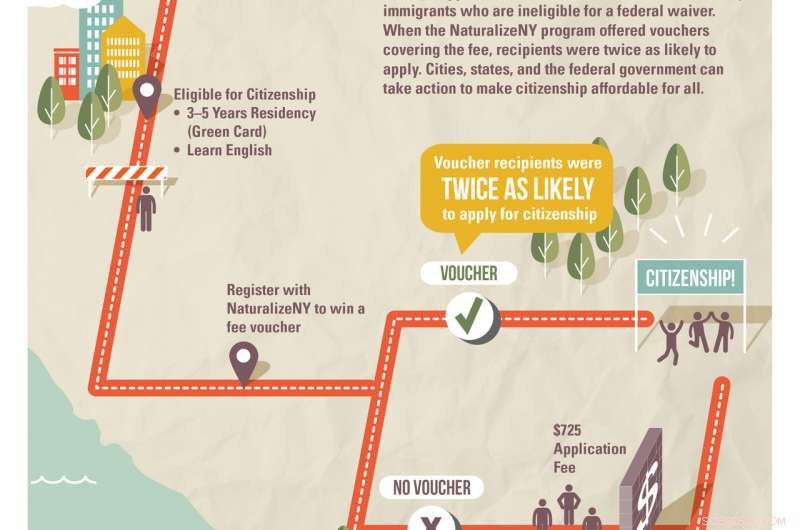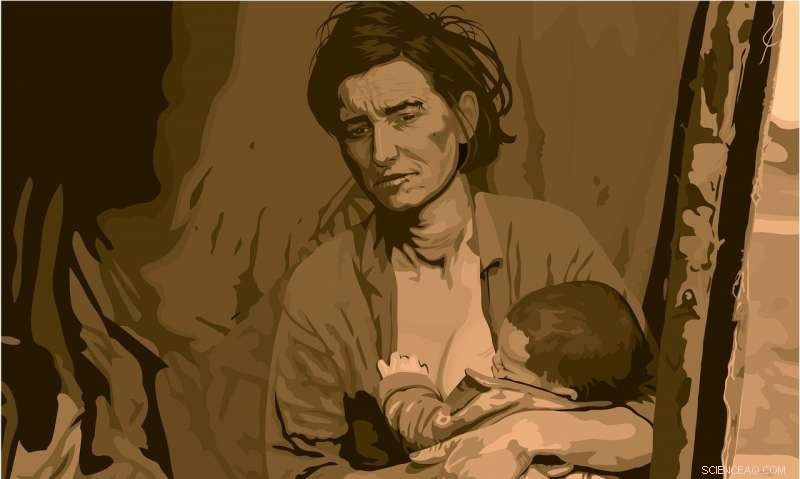
En ny studie avslöjar ekonomiska hinder för medborgarskap för låginkomsttagare. Kredit:Immigration Policy Lab, Stanford University
Att avlägga trohetseden vid en naturaliseringsceremoni är ett känslosamt ögonblick för många invandrare, och av goda skäl:det är kulmen på en ofta mödosam process och många års strävan. Medborgarskap öppnar också ett nytt kapitel markerat av möjlighet, från bättre arbetsmöjligheter till fullt deltagande i samhällslivet.
Men för många invandrare som strävar efter att bli amerikanska medborgare, det ögonblicket kommer aldrig. Sedan 1970-talet, naturaliseringsgraden i USA har hamnat efter andra stora värdländers. Det är en slående skillnad med tanke på att den stora majoriteten av invandrarna i USA uttrycker intresse för medborgarskap. Och eftersom att få medborgarskap ofta ökar invandrarnas sociala rörlighet och integration, det faktum att så många lämnas kvar tyder på en oroande förlust av solidaritet för sina värdsamhällen.
Vad håller dem tillbaka? Varför är vissa invandrare mer benägna än andra att slutföra naturaliseringsprocessen?
Ny forskning från Stanford Universitys Immigration Policy Lab, i samarbete med forskare vid George Mason University och Rockefeller College of Public Affairs &Policy vid University at Albany, ger det första konkreta beviset på ett stort hinder för medborgarskap för låginkomsttagare. Resultaten hjälper till att förklara varför insatser för att främja medborgarskap står inför betydande utmaningar, och de tillhandahåller en plan för lösningar för att säkerställa att alla invandrare har lika tillgång till medborgarskap och dess fördelar.
Ett livsförändrande program
Genom att försöka förstå skillnader i naturaliseringsmönster, tidigare studier har fokuserat på invandrarna själva – individuella egenskaper som språkkunskaper, Resurser, eller ursprungsland. Här, forskarna ansåg en extern faktor utanför invandrarnas kontroll:de höga kostnaderna för ansökningsprocessen för medborgarskap.
För många låginkomstinvandrare, prislappen är skrämmande:$725 bara för att lämna in ansökan, plus hundratals eller till och med tusentals fler om du behöver engelska lektioner eller samråd med invandringsadvokater. Välgörenhetsorganisationer har ökat för att tillhandahålla gratis språkutbildning, juridisk rådgivning, och hjälp med att navigera i pappersarbetet. Men ansökningsavgiften har bara blivit mer betungande, stigit med 800 procent i reala termer sedan 1985, när det var $ 35 (eller $ 80,25 i dagens dollar). Den federala regeringen erbjuder en avgiftsbefrielse för de fattigaste invandrarna – de med inkomster under 150 % av fattigdomsgränsen – men för många andra som inte är utblottade utan kämpar för att klara sig, enbart den avgiften kan sätta medborgarskapet utom räckhåll.
För att hantera detta potentiellt avgörande ekonomiska hinder, IPL slog sig ihop med New York State Office for New Americans (ONA) och två finansiärer dedikerade till att förbättra livet för utsatta New York-bor, Robin Hood, och New York Community Trust. Tillsammans utvecklade de en innovativ, offentlig-privat program som heter NaturalizeNY, som ger låginkomsttagare möjlighet att vinna en kupong som täcker ansökningsavgiften för naturalisering.
Veyom Bahl, en VD på Robin Hood, sa, "Robin Hood är stolt över att samarbeta med forskarna i världsklass vid Stanford Immigration Policy Lab. Som vi, de är engagerade i att hjälpa invandrarfamiljer att bygga en stark grund för ett nytt liv i USA. Denna forskning kommer att hjälpa stiftelser, samhällsbaserade organisationer, och politiker omprövar hur vi investerar i våra samhällen för maximal effekt."
NaturalizeNY förbinder också registranter med ansökningshjälp från ONA:s nätverk av ideella tjänsteleverantörer. New Yorks ledande invandrarorganisationer, inklusive CUNY medborgarskap nu !, spansktalande federation, och katolska välgörenhetsorganisationer, var också viktiga för att främja och genomföra programmet.
"Detta var ett verkligt förstklassigt program, där en statlig myndighet, filantropier, akademiker, och ideella organisationer skapade ett sätt att ge direkt ekonomiskt stöd för att hjälpa låginkomsttagare ansöka om medborgarskap. Immigration Policy Lab var glada över att delta i sin design och utvärdering så att alla inblandade kunde förstå dess inverkan på invandrare och New York-samhället, "sa Michael Hotard, en IPL-programledare.
New York är hem för landets näst största invandrarbefolkning, och dess storstadsområde har cirka 160, 000 låginkomsttagare berättigade till medborgarskap. Med en registreringswebbplats på sju språk, NaturalizeNY fokuserade på relativt fattiga New York -bor som, på grund av inkomst eller brist på behörighet för statliga förmåner som matstämplar eller kontanthjälp, did not qualify for the existing federal fee waiver program.
NaturalizeNY used a lottery to award the 336 available vouchers, leaving 527 registrants without one. By following the two groups to see how many completed the citizenship application, researchers could measure the power of financial assistance, and in turn determine how much the costs may discourage others from naturalizing.

Kredit:CC0 Public Domain
The results were unequivocal:the vouchers roughly doubled the application rate, from 37 percent among those without a voucher to 78 percent among recipients. The vouchers proved particularly effective for those who registered in Spanish; their application rate rose by 51 percent compared to a 36 percent rise among English speakers.
"Because NaturalizeNY uses a lottery system to equitably distribute vouchers to eligible registrants, for the first time we have clear causal evidence as to the effect of application fee vouchers on citizenship decisions. The magnitude of the effect suggests that it's a critical lever to improve low-income immigrants' access to citizenship", said Jens Hainmueller, a professor of political science at Stanford and IPL co-director.
The Deeper Challenges of Poverty
For the poorest immigrants, dock, even eliminating the application cost isn't necessarily enough to pave the way toward citizenship. They may not know that they're eligible for a fee waiver, or they may find the process too difficult if they're working several jobs, caring for children or elderly relatives, or unable to get assistance with the application.
Do these kinds of disadvantages keep these immigrants from becoming citizens? Att få reda på, researchers identified 1, 760 immigrants who registered for NaturalizeNY but weren't entered into the lottery because they likely qualified for the federal fee waiver. While the voucher group's average annual household income was $19, 000 per person, this group's average was just $7, 500. Everyone in this group received a message during registration informing them that, based on their responses, they likely could apply for citizenship without cost and that assistance was available. 1, 124 then received various "nudges" encouraging them to apply and to visit a local service provider for help navigating the process.
These nudges mimicked the real-world interventions many groups rely on to reach immigrants in need:emails, phone calls, text messages, an official letter by regular mail, and a $10 MetroCard intended to allay the cost of commuting to a service provider. Yet none of these encouragements made a significant difference in application rates beyond the 44 percent for those who received no additional encouragements.
In follow-up surveys, many participants said they had been too busy to apply. But when researchers returned to the data, they found that busyness couldn't be the whole answer:the nudges were just as ineffective for single people as for members of large households, and for those of working age and retirement age.
"That so many ended up not applying indicates that challenges to naturalization run deeper than financial constraints, " said Duncan Lawrence, IPL executive director. "It's clear that we have more to learn about what sorts of cost-effective nudges may or may not work. Raising awareness of the fee waiver itself may be an important piece of the puzzle, and we are actively working to understand how learning about the fee waiver affects application rates."
Citizenship and Social Mobility
For policymakers looking to address social inequality and give low-income immigrants a potential pathway to the middle class, the voucher results speak volumes. The current naturalization system imposes prohibitive costs on exactly those immigrants who might stand to benefit the most from the opportunities citizenship brings.
NaturalizeNY could inspire other cities and states to create similar public-private partnerships. ONA director Laura Gonzalez-Murphy emphasized the project's actionable insights, saying, "The New York State Office for New Americans Opportunity Centers are leaders on the ground, establishing strong relationships and trust with immigrants and refugees from across the world. We are always eager to eliminate barriers for these individuals and help them on their path to citizenship. Thanks to our partners, including Stanford, George Mason, and SUNY Albany, we now have a unique project to paint a real picture of the current immigration system and see where opportunities for positive change may arise."
At the federal level, U.S. Citizenship and Immigration Services (USCIS) recently lowered the fee for applicants between 150 and 200 percent of the poverty level. As this research illustrates, dock, the financial barrier remains decisive for low-income immigrants above that range. Expanding this tiered system, with wealthier applicants paying more, would allow USCIS to cover its administrative costs while keeping citizenship affordable for all.
These are relatively simple projects to fund and administer, and they have a potentially big long-term payoff:if becoming an American citizen makes immigrants more likely to pursue higher education, start a business, or enter a profession, then boosting naturalization rates would make for better integrated, more prosperous communities.